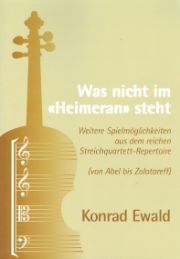From Abel to Zolotareff
Playing possibilities for string quartet beyond the hundred standard works can be found in the new book by Konrad Ewald.

Like the manual Music for viola. The rich repertoire from Aaltonen to ZytowitschThe fourth version of which was published in 2013, the work now dedicated to music for string quartet and also self-published is also a collection of very personal experiences and recommendations. The secondary school teacher Konrad Ewald was already playing in a local orchestra as a violinist and violist at the age of seventeen. Later, the extremely adventurous amateur belonged to several string quartets, playing around 1000 works by almost 400 composers over six decades.
The main part of the book, illustrated with title pages of scores, proves to be an idiosyncratic guide to the little-known quartet literature. In the introduction, the author comments on the annotated works: "The fact that they are unknown has nothing to do with them, but with us. We do not know them. They have all given us something (or wanted to give us something), we have not taken note of it." Ewald was inspired to write by the question: "Why do most string quartet formations only ever play the same 100 works by just 20 composers?"
The book title refers to the standard work first published in 1936 The quietly enjoyable string quartet by Ernst Heimeran, which has contained newly formulated reviews of works by Bruno Aulich since the 17th edition in 1969. Ewald frequently underpins his recommendations with quotations from chamber music guides by Wilhelm Altmann and from Friedhelm Krummacher's three-volume History of the string quartet. In the alphabetically arranged contributions, he not only deals with technical problems and the musical content of the compositions, but also with new editions of long out-of-print works and CD recordings.
With his in-depth specialist knowledge, Ewald puts many unsuspecting chamber music professors who know neither the spirit of discovery nor passion to shame. There are particularly exciting things to discover in the intelligent commentaries on the works of Elfrida Andrée, Carl Czerny, the Swiss early Romantic composer Friedrich Theodor Fröhlich, Friedrich Gernsheim, Louis Théodore Gouvy, Alexander Gretschaninow, Emilie Mayer, the Lachner brothers, Friedrich Lux, Louis Massonneau, Bernhard Molique, Nikolai Myaskovsky, Ignaz Joseph Pleyel, Carl Gottlieb Reissiger, Beethoven's pupil Ferdinand Ries, Anton Rubinstein, Anton Ferdinand Titz and Wenzel Heinrich Veit.
Ewald's book gives an idea of the inexhaustible wealth of quartets that Hermann Walther described in his Directory of the string quartet. String quartet compositions from 1700 to the present day (Schott, Mainz 2017, cf. Swiss Music Newspaper 3/2020, p. 21) with works by over 11,000 composers. If you want to study international string quartet music in depth, there is no getting around these two books.
Konrad Ewald: What is not in the "Heimeran". Further playing possibilities from the rich string quartet repertoire (from Abel to Zolotareff), 224 p., Fr. 36.00, self-published by Konrad Ewald, Liestal 2020, distributed by Schlöhlein GmbH, Basel, ISMN 979-0-50274-999-6








